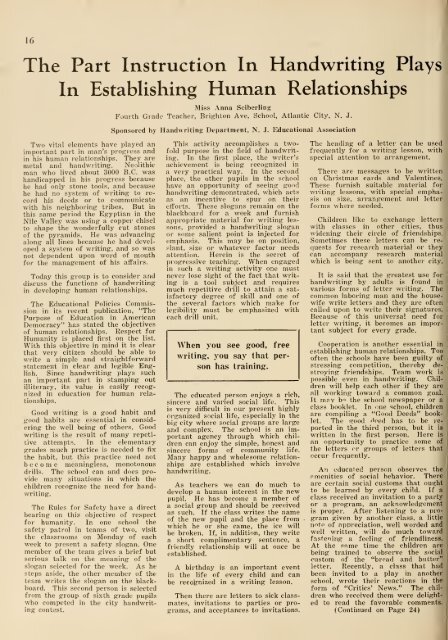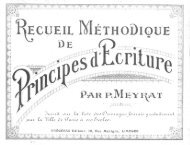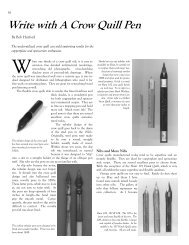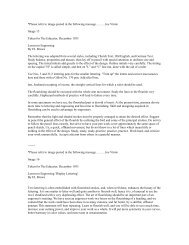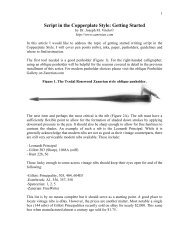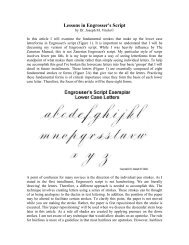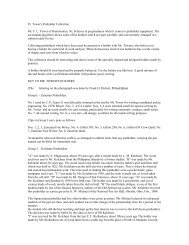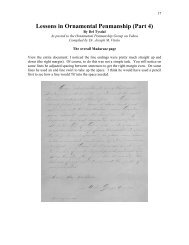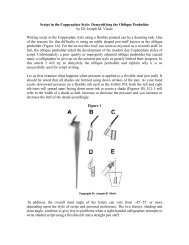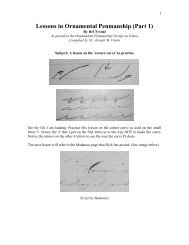The Educator (Volume 45) - IAMPETH
The Educator (Volume 45) - IAMPETH
The Educator (Volume 45) - IAMPETH
Create successful ePaper yourself
Turn your PDF publications into a flip-book with our unique Google optimized e-Paper software.
16<br />
<strong>The</strong> Part Instruction In Handwriting Plays<br />
In Establishing Human Relationships<br />
Two vital elements have played an<br />
important part in man's progress and<br />
in his human relationships. <strong>The</strong>y are<br />
metal and handwriting. Neolithic<br />
man who lived about 3000 B.C. was<br />
handicapped in his progress because<br />
he had only stone tools, and because<br />
he had no system of writing to record<br />
his deeds or to communicate<br />
with his neighboring tribes. But in<br />
this same period the Egyptian in the<br />
Nile Valley was using a copper chisel<br />
to shape the wonderfully cut stones<br />
of the pyramids. He was advancing<br />
along all lines because he had developed<br />
a system of writing, and so was<br />
not dependent upon word of mouth<br />
for the management of his affairs.<br />
Today this group is to consider and<br />
discuss the functions of handwriting<br />
in developing human relationships.<br />
<strong>The</strong> Educational Policies Commission<br />
in its recent publication, "<strong>The</strong><br />
Purpose of Education in American<br />
Democracy" has stated the objectives<br />
of human relationships. Respect for<br />
Humanity is placed first on the list.<br />
With this ob.jective in mind it is clear<br />
that very citizen should be able to<br />
write a simple and straightforward<br />
statement in clear and legible English.<br />
Since handwriting plays such<br />
an important part in stamping out<br />
illiteracy, its value is easily recognized<br />
in education for human relationships.<br />
Good writing is a good habit and<br />
good habits are essential in considering<br />
the well being of others. Good<br />
writing is the result of many repetitive<br />
attempts. In the elementary<br />
grades much practice is needed to fix<br />
the habit, but this practice need not<br />
become meaningless, monotonous<br />
drills. <strong>The</strong> school can and does provide<br />
many situations in which the<br />
children recognize the need for handwriting.<br />
<strong>The</strong> Rules for Safety have a direct<br />
bearing on this objective of respect<br />
for humanity. In one school the<br />
safety patrol in teams of two, visit<br />
the classrooms on Monday of each<br />
week to present a safety slogan. One<br />
member of the team gives a brief but<br />
serious talk on the meaning of the<br />
slogan selected for the week. As he<br />
steps aside, the other member of the<br />
team writes the slogan on the blackboard.<br />
This second person is selected<br />
from the group of sixth grade pupils<br />
who competed in the city handwriting<br />
contest.<br />
Miss Anna Seiberling<br />
Fourth Grade Teacher, Brighton Ave. School, Atlantic City, N. J.<br />
Sponsored by Handwriting Department, N. J. Educational Association<br />
This activity accomplishes a twofold<br />
purpose in the field of handwriting.<br />
In the first place, the writer's<br />
achievement is being recognized in<br />
a very practical way. In the second<br />
place, the other pupils in the school<br />
have an opportunity of seeing good<br />
handwriting demonstrated, which acts<br />
as an incentive to spur on their<br />
efforts. <strong>The</strong>se slogans remain on the<br />
blackboard for a week and furnish<br />
appropriate material for writing lessons,<br />
provided a handwriting slogan<br />
or some salient point is injected for<br />
emphasis. This may be on position,<br />
slant, size or whatever factor needs<br />
attention. Herein is the secret of<br />
progressive teaching. When engaged<br />
in such a writing activity one must<br />
never lose sight of the fact that writing<br />
is a tool subject and requires<br />
much repetitive drill to attain a satisfactory<br />
degree of skill and one of<br />
the several factors which make for<br />
legibility must be emphasized with<br />
each drill unit.<br />
When you see good, free<br />
writing, you say that per-<br />
son has training.<br />
<strong>The</strong> educated person enjoys a rich,<br />
sincere and varied social life. This<br />
is very difficult in our present highly<br />
organized social life, especially in the<br />
big city where social groups are large<br />
and complex. <strong>The</strong> school is an important<br />
agency through which children<br />
can enjoy the simple, honest and<br />
sincere forms of community life.<br />
Many happy and wholesome relationships<br />
are established which involve<br />
handwriting.<br />
As teachers we can do much to<br />
develop a human interest in the new<br />
pupil. He has become a member of<br />
a social group and should be received<br />
as such. If the class writes the name<br />
of the new pupil and the place from<br />
which he or she came, the ice will<br />
be broken. If, in addition, they write<br />
a short complimentary sentence, a<br />
friendly relationship will at once be<br />
established.<br />
A birthday is an important event<br />
in the life of every child and can<br />
be recognized in a writing lesson.<br />
<strong>The</strong>n there are letters to sick classmates,<br />
invitations to parties or programs,<br />
and acceptances to invitations.<br />
<strong>The</strong> heading of a letter can be used<br />
frequently for a writing lesson, with<br />
special attention to arrangement.<br />
<strong>The</strong>re are messages to be written<br />
on Christmas cards and Valentines.<br />
<strong>The</strong>se furnish suitable material for<br />
writing lessons, with special emphasis<br />
on size, arrangement and letter<br />
forms where needed.<br />
Children like to exchange letters<br />
with classes in other cities, thus<br />
widening their circle of friendships.<br />
Sometimes these letters can be requests<br />
for research material or they<br />
can accompany research material<br />
which is being sent to another city.<br />
It is said that the greatest use for<br />
handwriting by adults is found in<br />
various forms of letter writing. <strong>The</strong><br />
common laboring man and the housewife<br />
write letters and they are often<br />
called upon to write their signatures.<br />
Because of this universal need for<br />
letter writing, it becomes an impoi'tant<br />
subject for every grade.<br />
Cooperation is another essential in<br />
establishing human relationships. Too<br />
often the schools have been guilty of<br />
stressing competition, thereby destroying<br />
friendships. Team work is<br />
possible even in handwriting. Children<br />
will help each other if they are<br />
all working toward a common goal.<br />
It mav h° the school newspaper or a<br />
class booklet. In one school, children<br />
are compiling a "Good Deeds" booklet.<br />
<strong>The</strong> good deed has to be reported<br />
in the third person, but it is<br />
written in the first person. Here is<br />
an opportunity to practice some of<br />
the letters r-r groups of lettei'S that<br />
occur frequently.<br />
An educated person observes the<br />
amenities of social behavior. <strong>The</strong>re<br />
are certain social customs that ought<br />
to be learned by every child. If a<br />
class received an invitation to a party<br />
or a program, an acknowledgement<br />
is proper. After listening to a program<br />
given by another class, a little<br />
nite of appreciation, well worded and<br />
well written, will do much toward<br />
fastening a feeling of friendliness.<br />
At the same time the children are<br />
being trained to observe the social<br />
custom of the "bread and butter"<br />
letter. Recently, a class that had<br />
been invited to a play in another<br />
school, wrote their reactions in the<br />
form of "Critics' News." <strong>The</strong> children<br />
who received them were delighted<br />
to read the favorable comments. |<br />
(Continued on Page 24)


